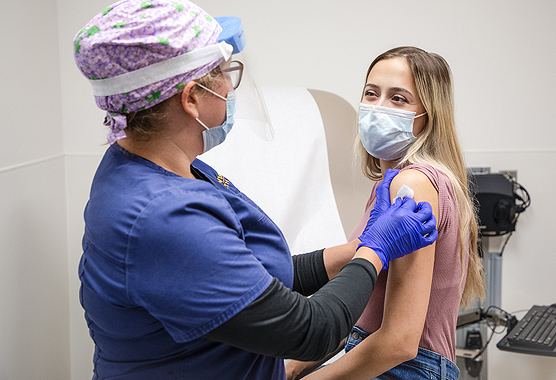HPV (Human Papillomavirus)
We offer HPV education, vaccinations and treatment for HPV-related diseases.
Medically reviewed by Dean Blumberg, M.D. on Aug. 18, 2023.

Complete Care and Prevention of HPV
At UC Davis Health, we offer the full spectrum of education, prevention and care for human papillomavirus. Pediatricians and pediatric infectious disease specialists at UC Davis Children’s Hospital give parents the vaccination information they need.
In addition, gynecologists and oncologists provide screenings, diagnosis and treatment for adults with HPV-related concerns.
What Is HPV?
Human Papillomavirus (HPV) is the most common sexually transmitted infection in the U.S. It affects about 13 million people each year. In fact, HPV is so common that most sexually active people will get the virus in their lifetime. People of any gender can get HPV.
There are more than 100 types of HPV. Some types are harmless and go away on their own. Others cause warts (papillomas) on your body or genitals.
A few high-risk HPV strains lead to cancer. HPV is the leading cause of cervical cancer and increases your risk for other cancers, including:
- Anal cancer
- Oropharyngeal cancer (back of throat and tonsils)
- Penile cancer
- Vaginal cancer
- Vulvar cancer
The HPV vaccine prevents nearly 90% of HPV-related cancers. The vaccine is most effective before someone is sexually active and exposed to the virus. This is why it is recommended for adolescents between the ages of 11 and 12.
HPV Symptoms
HPV doesn't usually cause symptoms, which is why many people don’t know they have it. Sometimes the infection can lead to genital warts. Warts may look like whitish clusters of bumps on your genitals.
Symptoms of HPV-Related Cancers
Signs that HPV has become cancer may include:
- Abnormal discharge or blood from your vagina or penis
- Itchy genitals
- Lumps in your genitals, neck or throat
- Painful sores on your genitals
- Persistent sore throat or cough
- Skin changes on your penis or vulva
HPV Causes and Risk Factors
HPV is an infection spread through sexual contact. You can spread HPV during oral, vaginal or anal sex, even if you don’t have symptoms.
There doesn’t necessarily have to be intercourse or ejaculation to transmit HPV. Any type of skin-to-skin genital contact with someone who has the virus puts you at risk.
HPV can cause cancer by changing how cells communicate and behave. Conditions such as cervical dysplasia or anal dysplasia are precancers, meaning abnormal cells are present. When treated early, precancerous cells may not turn into cancer.
You are at a higher risk for HPV if you have any of the following risk factors.
Have Not Gotten the HPV Vaccine
The HPV vaccine is very effective at preventing certain cancers and nearly 100% effective at preventing genital warts. People who did not receive the vaccine before age 26 are at a higher risk of infection.
Start Having Sex at a Young Age
Becoming sexually active before age 18 increases a woman’s chances of cervical cancer. Earlier exposure to HPV may give the virus more time to damage cells in your cervix. This makes it especially important for girls to receive the HPV vaccine before they begin having sex.
Have Multiple Sexual Partners or One High-Risk Partner
The odds of HPV exposure increase if you have more than one sexual partner, or if you have one partner who has other sexual partners.
Diagnosing HPV
Your healthcare provider may suspect HPV if you have genital warts. An HPV test is necessary to confirm the diagnosis.
Current screening guidelines recommend that women between the ages of 30 and 65 have an HPV test or HPV/Pap co-test every five years. There are currently no tests or screening guidelines for HPV in men.
For women, the test is part of routine cervical cancer screening. Your health care provider does the test at the same time as a Pap test.
An HPV test examines a sample of cells from your cervix for genetic material from the virus. A positive HPV test does not mean you have cancer.
If you test positive for HPV, your provider may order additional tests. A colposcopy is a procedure to examine your cervix for dysplasia or other abnormalities.
During the procedure, we may take a sample of tissue from your cervix for a biopsy. A biopsy can determine if you have precancer or cancer.
HPV Treatments
There is no cure for HPV, but your provider can recommend treatment based on your test results and the type of HPV you have. Low-risk HPV usually clears up on its own within a few years. High-risk HPV requires monitoring and possibly treatment.
Wart Treatment
Your provider may recommend medicated cream or a chemical treatment to remove warts. In some cases, we use intense heat, cold or an electrical current to destroy warts.
Cervical Dysplasia Treatment
Your provider will remove precancers so they don’t progress to cancer. We may perform loop electrosurgical excision procedure (LEEP). LEEP uses an electrically charged wire loop to remove abnormal tissue from your cervix.
Cancer Treatment
If HPV has progressed to cervical cancer or another type of cancer, you may need a combination of treatments. Surgery, chemotherapy and radiation therapy are the most common cancer treatments. Treatment will depend on the stage of the cancer (how it has grown and spread).
Protect Yourself Against HPV
You can reduce your risk of human papillomavirus and HPV-related cancers.
Get Vaccinated
Adolescents (girls and boys) should get the vaccine at age 11 or 12. Everyone through age 26 should receive the vaccine if they haven’t already been vaccinated. Your healthcare provider may recommend vaccination for adults between the ages of 27 and 45 in certain cases.
Get Routine Cervical Cancer Screening
Women aged 21 to 29 years old should receive a Pap test every three years. Women 30 to 65 years old should have an HPV or HPV/Pap co-test every five years. Continuing to get Pap tests every three years is also an option. Your provider may recommend more frequent cervical cancer screening depending on your health history and risk level.
Practice Safe Sex
If you are sexually active, use a condom or dental dam every time you have sex. Have sex with only one person and know their history of past sex partners and sexually transmitted infections.
Prevalence
42MPeople in the U.S. infected with high-risk HPV
Annual Infections
13MAmericans get infected each year
Cancer Risk
47K+HPV-related cancers occur in the U.S. each year
Sources: Centers for Disease Control and Prevention (CDC): HPV Infection
Request an Appointment
As Sacramento's No. 1 hospital, you'll benefit from unique advantages in primary care and specialty care. This includes prevention, diagnosis and treatment options from experts in 150 specialties.
Referring Physicians
To refer a patient, submit an electronic referral form or call.
800-4-UCDAVIS
Patients
Call to make an appointment.
Consumer Resource Center
800-2-UCDAVIS

Ranked among the nation’s best hospitals
A U.S. News & World Report best hospital in cardiology, heart & vascular surgery, diabetes & endocrinology, ENT, geriatrics, neurology & neurosurgery, and pulmonology & lung surgery.

Ranked among the nation’s best children’s hospitals
U.S. News & World Report ranked UC Davis Children’s Hospital among the best in pediatric nephrology, orthopedics*, and pulmonology & lung surgery. (*Together with Shriners Children’s Northern California)

Ranked Sacramento’s #1 hospital
Ranked Sacramento’s #1 hospital by U.S. News, and high-performing in aortic valve surgery, back surgery (spinal fusion), COPD, colon cancer surgery, diabetes, gynecological cancer surgery, heart arrhythmia, heart failure, kidney failure, leukemia, lymphoma & myeloma, lung cancer surgery, pacemaker implantation, pneumonia, prostate cancer surgery, stroke, TAVR, cancer, orthopedics, gastroenterology & GI surgery, and urology.

The nation’s highest nursing honor
UC Davis Medical Center has received Magnet® recognition, the nation’s highest honor for nursing excellence.

World-class cancer care
One of ~59 U.S. cancer centers designated “comprehensive” by the National Cancer Institute.

A leader in health care equality
For the 13th consecutive year, UC Davis Medical Center has been recognized as an LGBTQ+ Healthcare Equality Leader by the educational arm of America’s largest civil rights organization.

